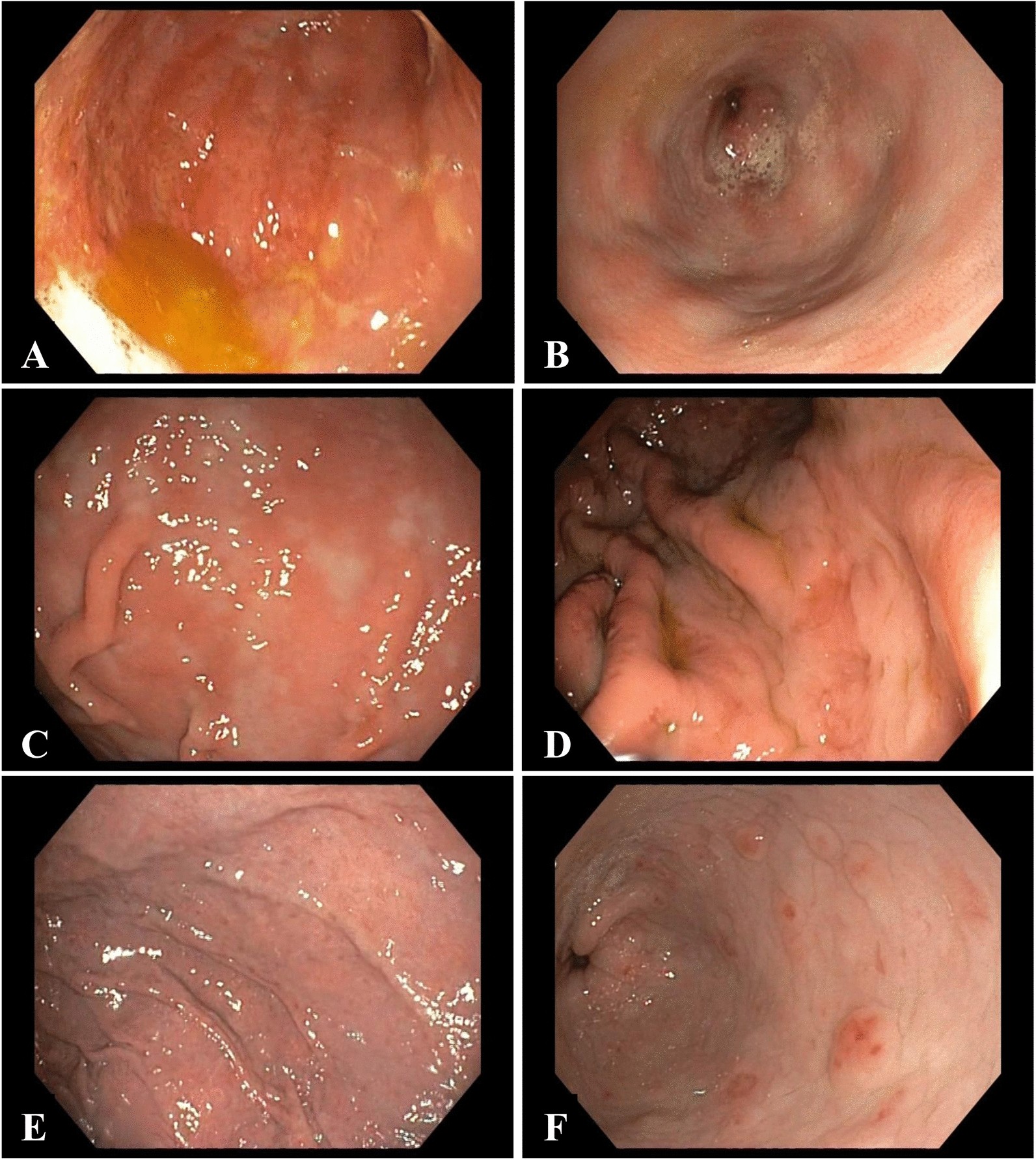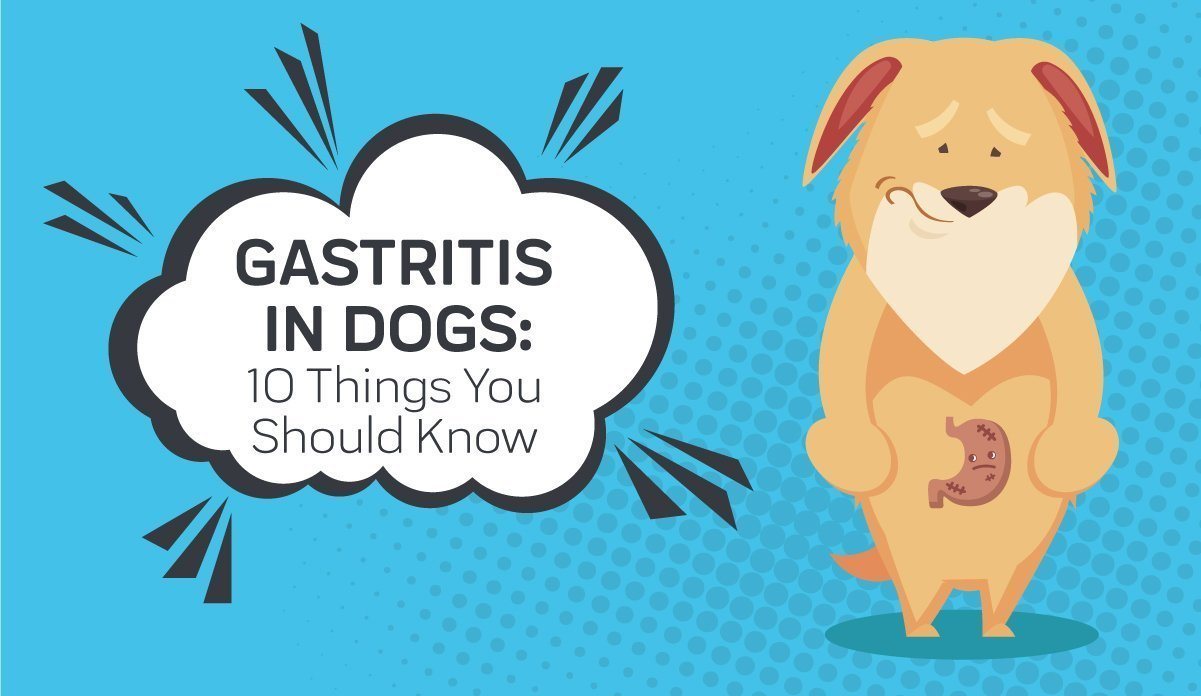Gastritis in dogs is the inflammation of the stomach lining, leading to excessive vomiting. It is a syndrome that can cause gastrointestinal upset and discomfort in dogs.
The most common clinical signs include sudden vomiting and decreased appetite (anorexia), which may result in dehydration. Gastritis can be caused by various factors such as dietary indiscretion, ingestion of spoiled or raw food, or underlying medical conditions. It is important to diagnose and treat gastritis in dogs promptly to alleviate symptoms and prevent further complications.
Proper management of diet, medication, and veterinary care can help in the successful treatment of gastritis in dogs.

Credit: actavetscand.biomedcentral.com
Understanding Gastritis In Dogs
Gastritis in dogs refers to inflammation of the stomach lining, often resulting in symptoms such as vomiting and decreased appetite. It can be caused by various factors, including dietary issues or ingesting harmful substances. Treatment options may include medication and dietary changes.
What Is Gastritis?
Gastritis is a common health issue that affects dogs, causing inflammation of the stomach lining. It is characterized by symptoms such as vomiting, decreased appetite, and discomfort. This condition can be acute or chronic, and it can have various causes. Understanding the nature of gastritis in dogs is crucial in identifying the underlying issues and providing appropriate treatment.
Causes Of Gastritis In Dogs
There are several factors that can contribute to the development of gastritis in dogs. These include:
- Poor diet: Feeding your dog low-quality or spoiled food can lead to gastritis.
- Infections: Bacterial or viral infections can cause inflammation in the stomach.
- Medication: Certain medications, such as nonsteroidal anti-inflammatory drugs (NSAIDs), can irritate the stomach lining.
- Toxins: Ingestion of toxic substances, such as cleaning products or poisonous plants, can trigger gastritis.
- Stress: Dogs experiencing high levels of stress may develop gastritis as a result.
Symptoms Of Gastritis In Dogs
Gastritis can manifest in various symptoms in dogs. Some common signs to watch out for include:
- Sudden vomiting
- Decreased appetite or anorexia
- Discomfort or abdominal pain
- Weight loss
- Dehydration
If you notice any of these symptoms in your dog, it is important to seek veterinary attention for a proper diagnosis and treatment plan.

Credit: www.innovetpet.com
Diagnosing And Treating Gastritis In Dogs
Diagnosing and treating gastritis in dogs involves identifying the common signs such as sudden vomiting and decreased appetite, and providing appropriate medical care to alleviate gastrointestinal inflammation. It is essential to address this condition promptly to ensure the well-being of our furry friends.
Diagnostic Procedures For Gastritis
Treatment Options For Gastritis
Preventing Gastritis In Dogs
When it comes to diagnosing and treating gastritis in dogs, it is crucial to understand the symptoms and take appropriate action. Gastritis, which refers to the inflammation of the stomach lining, can be a common condition in dogs that can lead to discomfort and digestive issues. If your furry friend is experiencing symptoms such as vomiting, decreased appetite, or abdominal pain, it is important to seek veterinary care for an accurate diagnosis. Let’s delve into the diagnostic procedures, treatment options, and preventive measures for gastritis in dogs.Diagnostic Procedures For Gastritis
Diagnosing gastritis in dogs requires a comprehensive approach that may involve various diagnostic procedures. Your veterinarian will begin by conducting a physical examination, checking for any signs of abdominal pain or discomfort. Additionally, they may recommend the following diagnostic tests to assess the severity of gastritis and rule out other underlying conditions:- Blood tests: Blood work can help identify any abnormal levels of inflammation markers or other underlying health issues.
- Urinalysis: A urine analysis is often conducted to evaluate the overall health of your dog’s kidneys and bladder.
- X-rays or Ultrasound: Imaging tests, such as X-rays or ultrasounds, can help visualize any abnormalities or obstructions within the stomach and digestive system.
- Gastrointestinal Endoscopy: This procedure involves inserting a small camera device into the digestive tract to directly visualize the stomach lining and obtain biopsies if necessary.
Treatment Options For Gastritis
Once a diagnosis of gastritis is confirmed, your veterinarian will develop a personalized treatment plan for your dog based on the severity of the condition. Treatment options may include:- Dietary Changes: Switching to a bland, easily digestible diet for a temporary period can help reduce stomach irritation and promote healing.
- Medications: Your veterinarian may prescribe medications such as antacids, anti-nausea drugs, or antibiotics to alleviate symptoms and treat any underlying infections.
- Fluid Therapy: In cases of dehydration resulting from gastritis, fluid therapy may be administered to restore hydration and balance electrolytes.
- Rest and Monitoring: Providing your dog with ample rest and closely monitoring their symptoms is essential to ensure a speedy recovery.
Preventing Gastritis In Dogs
Taking preventive measures can significantly reduce the risk of gastritis in dogs. Here are some tips to keep in mind:- Proper Nutrition: Feed your dog a balanced and high-quality diet that is suitable for their breed, age, and specific dietary needs.
- Avoid Food Scraps: Refrain from feeding your dog human foods, especially those that are high in fat, spicy, or contain toxic substances like chocolate and onions.
- Regular Veterinary Check-ups: Schedule routine check-ups to monitor your dog’s overall health and catch any potential issues early on.
- Hygiene and Clean Environment: Ensure your dog’s living space is clean and free from potential toxins or bacteria that could lead to digestive problems.
- Stress Management: Reduce stress levels in your dog’s life by providing a calm and secure environment, regular exercise, and positive reinforcement training.
Gastritis And Common Health Conditions In Dogs
Gastritis is a condition that affects the stomach lining in dogs, causing inflammation and discomfort. While it is a common health issue, it is often associated with other underlying health conditions in our furry friends. Understanding the connection between gastritis and these conditions can help us provide better care and management for our beloved pets.
Association Between Gastritis And Food Allergies
Food allergies are one potential underlying cause of gastritis in dogs. Just like humans, dogs can develop allergic reactions to certain foods. When a dog consumes a food allergen, it can trigger an immune response in the body, leading to inflammation in the stomach lining. This can result in the development of gastritis.
Common symptoms of gastritis caused by food allergies include:
- Vomiting
- Diarrhea
- Loss of appetite
- Abdominal pain or discomfort
If you suspect that your dog may have food allergies, it is important to work with your veterinarian to identify the specific allergens and modify their diet accordingly. A hypoallergenic or elimination diet may be recommended to help manage gastritis and alleviate symptoms.
Gastritis And Stress In Dogs
Stress can also play a role in the development of gastritis in dogs. Just like humans, dogs can experience stress from various factors such as changes in their environment, separation anxiety, or even emotional distress. When a dog is stressed, it can lead to alterations in their gastrointestinal function, including an increase in stomach acid production.
Common symptoms of gastritis caused by stress include:
- Vomiting
- Decreased appetite
- Depression or lethargy
- Changes in behavior
It is important to create a calm and stable environment for your dog to minimize stress levels. Regular exercise, mental stimulation, and providing a safe space can help alleviate stress and reduce the likelihood of gastritis episodes.
Gastritis And Underlying Diseases
Sometimes, gastritis can be a symptom of an underlying illness or disease in dogs. Conditions such as kidney disease, liver disease, pancreatitis, and inflammatory bowel disease can contribute to the development of gastritis. It is crucial to address and manage these underlying health issues to effectively control and reduce gastritis flare-ups.
Common symptoms of gastritis caused by underlying diseases include:
- Vomiting
- Weight loss
- Diarrhea
- Abdominal pain or discomfort
If your dog is experiencing recurrent or severe gastritis symptoms, it is essential to consult with your veterinarian. They will conduct a thorough examination and may recommend further diagnostic tests to identify any underlying diseases. Treatment will typically involve addressing the primary condition and managing gastritis symptoms with medications or a modified diet.

Credit: www.researchgate.net
Frequently Asked Questions Of Gastritis In Dogs
How Do You Treat Gastritis In Dogs?
To treat gastritis in dogs, you can use specific dog food like Royal Canin Gastro Intestinal or Hill’s Prescription Diet i/d. Avoid feeding them foods that may cause gastritis, such as spoiled or raw food. Monitor for signs of vomiting and decreased appetite, and seek veterinary care if necessary.
How Long Can Gastritis In Dogs Last?
Gastritis in dogs can last for a varying duration. It can be acute and last for a few days or chronic and persist for weeks or even months. Proper treatment and management can help alleviate symptoms and reduce the duration of gastritis.
What Foods Can Cause Gastritis In Dogs?
Certain foods that can cause gastritis in dogs include garbage, spoiled or raw food, molds, fungi, leftovers, and cat litter. These can lead to acute gastritis in dogs.
What Are The Clinical Signs Of Gastritis In Animals?
The most common sign of gastritis in animals is intermittent vomiting of food or bile. Weight loss, systemic illness, and GI ulceration are also possible but less frequent. These signs may indicate a more serious condition like inflammatory bowel disease or pythiosis.
Conclusion
Gastritis in dogs can cause significant discomfort and health issues. It is important for dog owners to be aware of the symptoms and causes of gastritis, such as vomiting, decreased appetite, and ingestion of harmful substances. Prompt treatment and prevention measures, including a balanced diet and avoiding ingesting garbage or spoiled food, can help alleviate the symptoms and improve the overall health of dogs.
Remember, early detection and proper management are key in ensuring the well-being of our beloved pets.


